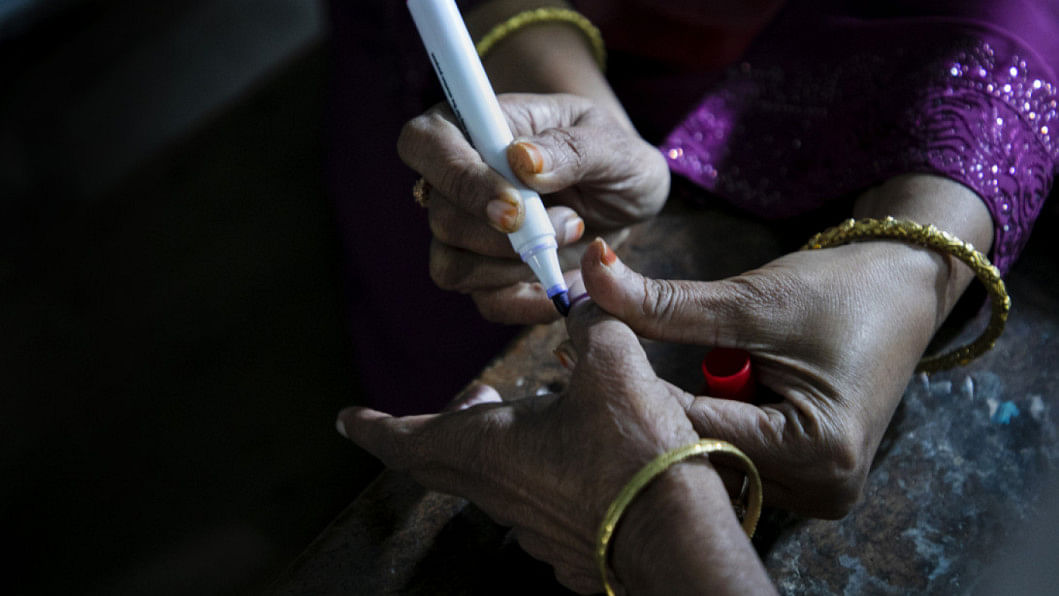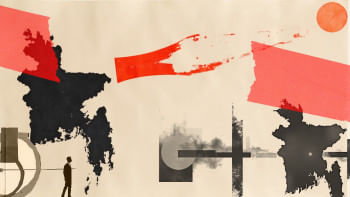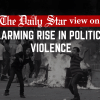Why we need an elected government soon

In the history of nations, moments arise when the choices made by a people define the trajectory of their collective destiny. Bangladesh now stands at such a critical juncture. The interim government, ushered in amid throes of mass movements and political upheaval, was meant to serve as a temporary custodian of stability—a bridge to democratic restoration. Instead, delays in holding the national election and growing discontent have threatened to turn this fragile bridge into a perilous path. For Bangladesh, the only way forward is through a legitimate, timely, and widely participatory democratic election.
Political scientist Samuel P Huntington, known for his incisive works on democracy and political order, once noted, "The most important political distinction among countries concerns not their form of government but their degree of government." In other words, legitimacy is not simply conferred by structure, but by people's will. Without democratic elections, Bangladesh's government remains suspended in an uncertain limbo, unable to claim the authority necessary to govern effectively.
The aspirations that fuelled Bangladesh's Liberation War in 1971 remain deeply unfulfilled. Two fundamental promises—democratic governance and social justice—have eluded realisation all these years. Mass movements that began as calls for administrative reform have evolved into broader cries for political representation. The chants heard in the streets—"We want democracy"—are not just slogans; they are pleas from a nation yearning for agency.
Philosopher John Stuart Mill, one of democracy's staunchest proponents, said the best form of government is one that enables its citizens to "participate in the management of affairs" and thereby grow in virtue and intelligence. Bangladesh's current political arrangement, however well-intentioned, denies its people this essential civic experience. By delaying elections, the interim authority deprives citizens of their right to shape their nation's course.
While the interim government has attempted some reforms and garnered international sympathy for its efforts, its Achilles' heel is its lack of electoral legitimacy. Political psychologist Seymour Martin Lipset famously argued that "legitimacy involves the capacity of the system to engender and maintain the belief that existing political institutions are the most appropriate or proper ones." When that belief erodes, unrest is inevitable. Bangladesh now teeters on such a precipice.
Inflation has surged, unemployment festers, and lawlessness permeates the streets. The so-called "mob culture" and the rise of juvenile gangs underline a deeper problem: an absence of institutional authority. These are not mere symptoms of economic malaise but signs of political vacuum. Economist Amartya Sen, in his work Development as Freedom, emphasised that political freedoms, including free and fair elections, are not just instruments of development but its constitutive elements. Without elections, development in Bangladesh becomes a house built on sand.
Interim administrations are meant to be brief custodians, not long-term stewards. History shows that prolonged transitional governments in developing nations often breed instability, corruption, and even authoritarian regression. The 1/11 crisis of 2007-08 remains a frightening reminder of what can happen when democratic processes are suspended under the guise of reform.
Opponents of early elections argue that reform is a prerequisite for meaningful voting. Yet, the converse is equally true: constitutional liberalism without elections is merely an illusion of democracy. Elections do not guarantee perfect governance, but they offer a mechanism for accountability. Elected governments, by their very nature, are more responsive to the needs of their constituents. They have deep-rooted connections to grassroots networks and are bound by the pressure of re-election. An unelected interim regime, however virtuous, lacks the same incentive structure.
Bangladesh's economic indicators are already showing stress. Inflationary pressures have eroded purchasing power, while investor confidence continues to wane. Political uncertainty acts as a repellent to both domestic and foreign investment. The World Bank and International Monetary Fund (IMF) have both highlighted the importance of political stability in ensuring sustainable economic growth. Without a credible, elected government, Bangladesh risks a slide into economic stagnation.
Political scientist Francis Fukuyama, in Political Order and Political Decay, observed that "modern political institutions are not born fully formed; they are forged through struggle and shaped by context." For Bangladesh, the struggle now is to consolidate its institutions through a recommitment to electoral democracy. That struggle cannot succeed under a prolonged interim arrangement.
Some voices have called for a "national government" or an extended caretaker system as a solution to the crisis. But this model, too, is fraught with risk. Such arrangements dilute accountability and blur the lines of responsibility. In developing nations, where democratic culture is still in a formative stage, power-sharing without clear electoral mandates often becomes a recipe for deadlock and dysfunction.
Moreover, national governments formed outside the electoral process often become a safe haven for opportunists and power-brokers—political chameleons who switch allegiance for personal gain. The danger is not just theoretical; it has played out in Bangladesh before. When governments form through backroom deals rather than ballot boxes, the people are always the losers.
Bangladesh's youth, the lifeblood of its mass movements, have spoken clearly. They demand a future rooted in justice, transparency, and democratic participation. Their voices echo the words of Vaclav Havel, the Czech dissident and later president, who believed that "the salvation of this human world lies nowhere else than in the human heart, in the human power to reflect, in human meekness, and human responsibility."
To delay elections is to deny people the power to reflect and to choose. The interim government must now do what it was originally tasked to do: create a level playing field for all political actors, initiate essential reforms to ensure a fair election, and hand over power to an elected government. This process must be time-bound, transparent, and inclusive. It must culminate not in vague promises but in a specific date for the election, announced publicly and adhered to.
Bangladesh's revolution did not end in 1971—it merely began. The revolution continues in every protest, every slogan, every vote. Let it not be betrayed by political indecision or bureaucratic inertia. In the words of political philosopher Hannah Arendt, "The most radical revolutionary will become a conservative the day after the revolution." Let the current leaders not become what they once opposed. Let them lead Bangladesh not back into the shadows, but forward into the light of democratic legitimacy. Only through elections can Bangladesh reclaim its future. The bridge to democracy is not meant to be a destination—but a path. Let us not turn it into a dead end.
H.M. Nazmul Alam is an academic, journalist, and political analyst. He can be reached at [email protected].
Views expressed in this article are the author's own.
Follow The Daily Star Opinion on Facebook for the latest opinions, commentaries and analyses by experts and professionals. To contribute your article or letter to The Daily Star Opinion, see our guidelines for submission.


 For all latest news, follow The Daily Star's Google News channel.
For all latest news, follow The Daily Star's Google News channel. 










Comments